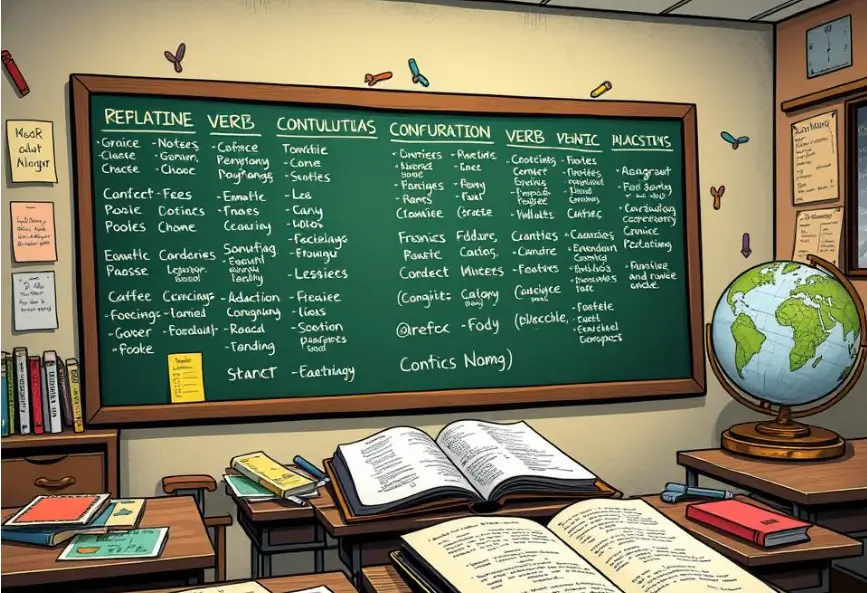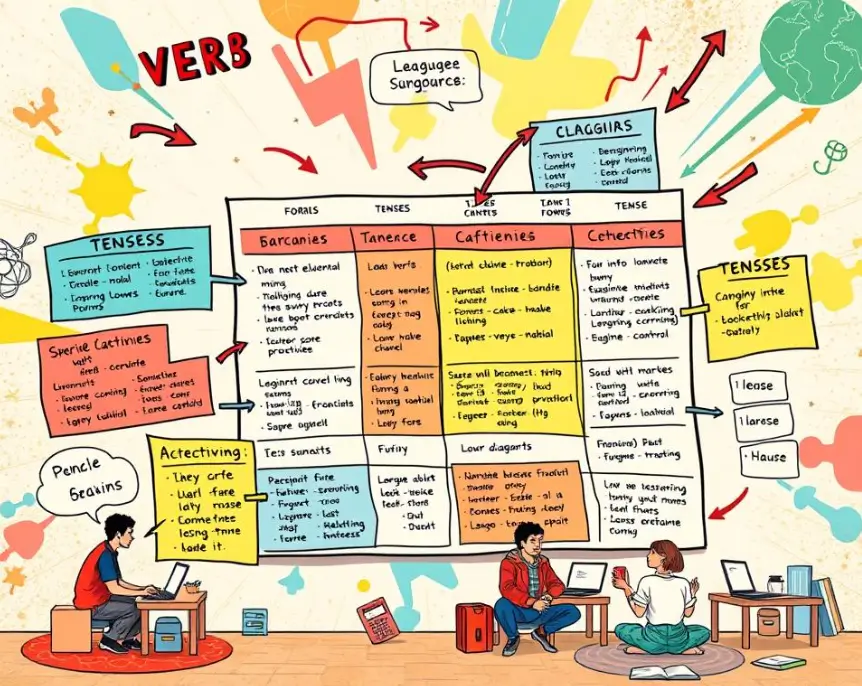English Verb Conjugation Test, First Level – Try Now
Do you know your English verb conjugations well? This test is for everyone, whether you’re learning English as a second language or are a native speaker. It’s designed to challenge and help you grow. Get ready to learn more about English verb conjugations.
Key Takeaways
- Assess your mastery of basic English verb conjugation rules
- Identify areas for improvement and target specific grammar concepts
- Gain hands-on practice with present, past, and future tense formations
- Develop a stronger foundation for effective communication in English
- Measure your progress and build confidence in your language skills

Understanding Basic Verb Conjugation Rules for Beginners
Learning English verb conjugation is crucial for those looking to improve. It’s important for conjugation rules, language learning, and ESL practice. This section covers the basics of regular and irregular verbs. It also explains how to form present simple, present continuous, and past tenses.
Regular vs Irregular Verb Patterns
Regular verbs follow a simple pattern. The verb stem stays the same, and you add endings based on the subject. For example, “walk” becomes “walks,” “walked,” and “walking.” But, irregular verbs don’t follow these rules. They need to be memorized because they have their own unique forms.
Knowing the difference between regular and irregular verbs is important. It helps learners understand conjugation rules better.
Present Simple and Continuous Tense Foundations
The present simple tense talks about regular actions, general truths, or current situations. It’s important to get the subject-verb agreement right in this tense. This helps in clear communication.
The present continuous tense, however, talks about actions happening right now. It’s vital to know the difference between these two tenses. This knowledge is crucial for language learning and ESL practice.
Past Tense Formation Basics
The past tense is for actions that have happened. Regular verbs add “-ed” to the stem to form the past tense. But, irregular verbs have their own past tense forms that need to be memorized.
Practicing both regular and irregular verbs in the past tense is important. It helps learners improve their conjugation rules and ESL practice.
“Mastering verb conjugation is the foundation of fluent language expression. With practice and patience, learners can develop a strong command of this essential grammatical skill.”
Interactive Practice Methods and Testing Strategies

Learning English verb conjugation needs both interactive practice and smart testing. Online quizzes and tests give you feedback. This helps you see where you need to get better and how far you’ve come. By checking yourself, you learn what you’re good at and what you need to work on.
Self-Assessment Techniques
Checking yourself regularly is key to fixing common mistakes. Look over your practice and test scores carefully. Notice the errors you make often. This will show you which verb forms or patterns you need to focus on more.
Common Conjugation Mistakes to Avoid
Knowing and fixing common mistakes can really help your test scores. Watch out for mistakes in subject-verb agreement, irregular verb forms, and tense use. By catching and fixing these errors, you’ll get better at English verb conjugation.
Time Management During Tests
Managing your time well is crucial for verb conjugation tests. Plan how you’ll use your time so you can review each question and check your answers. Don’t rush, as this can lead to mistakes. With good time management, you’ll do better on your tests.
English Verb Conjugation Test, First Level – Try Now
Take the Free Online English Conjugation Quiz
Conclusion:
Mastering English verb conjugation is crucial for language learners looking to enhance their proficiency.
The English Verb Conjugation Test, First Level provides a valuable opportunity to assess and improve your skills in this area.
By taking the test, you can pinpoint areas for growth and tailor your learning strategy accordingly. Don’t miss this chance to enhance your English language skills – Try Now.


I always in great motives to confidentially speak English fluently
I hopefully I shall get my certificate at the end of this short courses right?
Thanks for the exercise, make me feel better and want to e better in the future
This learn very good
Thanks , I am learning , will be better .
This test is so interesting. It refreshes my knowledge in English
Thank you so much.
I would like to know my English level test.